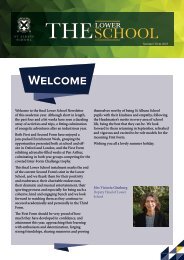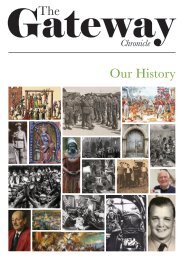You also want an ePaper? Increase the reach of your titles
YUMPU automatically turns print PDFs into web optimized ePapers that Google loves.
49<br />
Hidden Voices<br />
Should Britain be Ashamed of<br />
Winston Churchill?<br />
Everyone knows who Winston Churchill is. Everyone<br />
knows that his charismatic, pragmatic, and courageous<br />
leadership throughout the Second World<br />
War ensured final victory for the allies. Many such<br />
as our current Prime Minister believe that without<br />
him the War would have been lost. It is with good<br />
reason that we remember Churchill as a hero, he<br />
was an outstanding Military and Political leader<br />
in World War Two. His actions from bombarding<br />
the French Fleet on the 3 rd July 1940, to his rhetoric<br />
to keep Britain going in the Summer of 1940,<br />
to ramping up manufacturing capacity of planes,<br />
to his persistence with Roosevelt that led America<br />
to join the War effort. Churchill was even willing<br />
to put aside his hatred of Communism to ally with<br />
Stalin in May 1942 and went on national TV and<br />
said that “the Russian danger is our danger.” For all<br />
this Britain should rightly be proud of Churchill,<br />
he stood up and defeated possibly the greatest ever<br />
danger to the modern British values. The government’s<br />
prevent strategy describes these modern<br />
British values as democracy, respect and tolerance,<br />
individual liberty, and the rule of law. There is no<br />
doubt that Churchill defeated someone who went<br />
against those modern British values. However, there<br />
is also no doubt that Churchill himself failed to live<br />
up those modern British values.<br />
The first of Churchill’s views that undermine these<br />
modern British values was one that he advocated in<br />
his early Political career when he was Home Secretary.<br />
From January 1899 a letter sent by Churchill<br />
to his cousin shows that he was an advocate of<br />
eugenics. This is shown by the fact that he stated<br />
that “the improvement of the British breed is my<br />
aim in life.” Churchill in one of his first speeches<br />
to Parliament as Home Secretary in 1911 talked of<br />
the need for Labour Camps for the “feeble minded.”<br />
Not only did he want segregation for the feeble<br />
minded, but he wished for their sterilisation to not<br />
risk passing this onto to any future generation. He<br />
also began as Home Secretary the early drafting of<br />
the 1913 Mental Deficiency Act. This supported the<br />
transportation of those deemed to be idiots or imbecilic.<br />
This led to 65,000 people being transferred<br />
to Colonies. Churchill, however, did not feel the<br />
eventual bill went far enough as it did not include<br />
compulsory sterilisation. However, the fact that the<br />
bill did go through with only 3 votes against it and<br />
the fact that the Conservatives and Liberals set up<br />
a Commission in 1904 to investigate would suggest<br />
this view was commonly held at the time. Therefore,<br />
for Churchill to support Eugenics may be just something<br />
that can be put down to a commonly held<br />
view of the time. This view in support of Eugenics<br />
does however undermine those modern British values<br />
of tolerance and individual liberty.<br />
The view however that most undermines those<br />
modern British values of tolerance and respect is<br />
Churchill’s views on race. Thabo Mbeki who was<br />
President of South Africa from 1999-2008 picked<br />
up on this as he described Churchill’s views as racist<br />
and patronising. This is accurate as Churchill’s<br />
doctor Lord Moran at one point commented that<br />
“Winston thinks only of the colour of their skin.”<br />
Furthermore, he referred to Indians as “a beastly<br />
people with a beastly religion,” and of the Chinese<br />
said, “I hate people with slit eyes and pigtails.”<br />
Churchill also supported the 1955 Conservative<br />
slogan to “Keep England White,” as a response to<br />
migration. Defenders of Churchill often argue that<br />
these quotes have simply been taken out of their<br />
original context, however historian Rahul Rao<br />
repudiates this argument by accurately pointing<br />
out that in no context would these views be acceptable.<br />
Moreover, he points out the fact Churchill<br />
was a fantastic orator and a Nobel Prize winner for<br />
Literature in 1953. Therefore, the suggestion that<br />
Churchill could misspeak or not know what he was<br />
saying does not stand particularly strong. Unlike<br />
his views on eugenics this is not something that can<br />
be put down to Churchill just being a man of his<br />
time either. Even right-wing cabinet members such<br />
as Leo Amery, Secretary of State for India were<br />
concerned. Amery even stated that “he could not see<br />
much difference between Churchill’s outlook and<br />
Hitler’s.” Therefore, the fact that even some of his<br />
own Conservative colleagues were worried about<br />
Churchill’s outlook on race would suggest this was<br />
not a commonly held view of the time. This would<br />
suggest that Churchill undermined the current British<br />
value of respect and tolerance with his views<br />
and even undermined what was at the time considered<br />
to be respectful and tolerant.<br />
Moreover, Churchill’s views on Indians led to the<br />
deaths of 2.1 million Indians in 1943 due to the


















